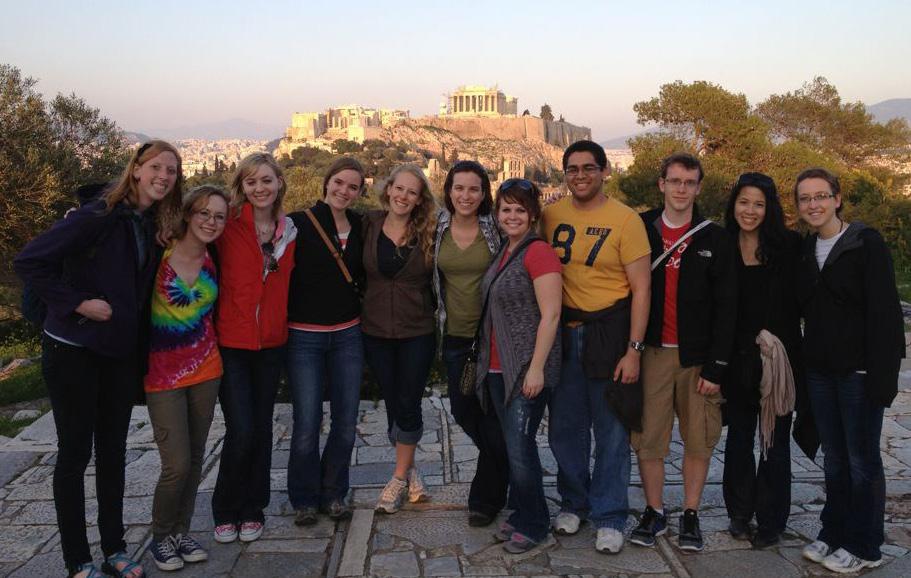
4 minute read
FACULTY FEATURE: Dr. Rocki Wentzel, Classics
SUCCESS
PROFESSOR COMBINES ANCIENT MYTHOLOGY & MODERN TECHNOLOGY
Augustana University Classics Professor Dr. Rocki Wentzel’s recent research compares Stranger Things to katabasis — an underworld journey — and one of her courses examines Pretty Woman, among many other films, as a Pygmalion myth. Wentzel, who teaches Greek and Latin, makes ancient myths relevant through teaching science fiction and romantic comedies.
“Classics is interdisciplinary by nature,” Wentzel said. “It is the study of ancient Greece and Rome, their languages, literature, philosophy, history, religion and archaeology. My area of research is called classical reception, which deals with the treatment of Greco-Roman material in literature and other media.”
Although the core of her field dates back more than 2,500 years, Wentzel looks at how the ideas, myths and traditions of that time appear in modern television and film.
Wentzel could look at obvious representations, like the Hercules movies, but she prefers to find more implicit or hidden forms that are being received today. That’s how Wentzel stumbled upon the most surprising aspect of her academic specialty: technology.
“I’ve been working a lot on film, but particularly films that are about technology and technological creatures,” Wentzel explained. “So, robots, artificial intelligence (AI), cyborgs and the myths that come out in those stories.”

EXPLORE MAJORS
No matter the major, Augustana University students learn by experience and discover through the liberal arts. At AU, students receive support and guidance while they actively “explore” how major options fit their goals.
Robots, AI and cell phones seem modern or futuristic, but for Wentzel, they are a site for discussing foundational ideas of ancient Greece and Rome. This intersection is what students learn about in her First-Year Seminar (FYS) course “Robot Love.”
Wentzel’s course starts with the Pygmalion myth, which is about a man who creates and loves a statue so much that Venus/Aphrodite brings her to life. The class must ask, “What is our relationship with our creations? How do they reflect who we are? What do they reveal about what it means to be human?”
From there, the class takes off. In other classes, such as Classical Mythology, Wentzel said she loves to let students bring their creative side to projects.
“I’ve discovered that I have many great artists, musicians, writers and performers among my students this way,” Wentzel said.
Some have created their own version of a myth in song, prose or a board game, such as The Game of Life or Monopoly: Mythology Edition.
Anyone who’s been on the 2nd-floor of the Fryxell Humanities Center has felt the influence of classics, as two murals wrap around the core of the building. One shows the conjugations of luo, meaning to free or destroy (“to loose”) in Greek, and amo, which means to love in Latin. The latter mural was created by Wentzel and the Classics Society over the course of 50 hours during a J-Term. They used small brushes and multiple colors of paint to create the lists of verb forms.
Tucked inside the Augustana Religion, Philosophy & Classics Department, the classics major studies ancient Roman and Greek societies, which includes learning to translate Greek and Latin language.
Since there is no conversation component, classics courses dive into text translations of upper-level poetry sooner than modern language students might.
“Translating this way is like solving a big puzzle,” Wentzel said. “If you like puzzles, you’ll like Latin and Greek.”
Wentzel leads her students across the globe on J-Term courses to Greece, which sometimes includes a stop in London. Besides the Jello-blue water of the Mediterranean and picturesque landscape, Wentzel’s favorite part is meeting the guides and locals.
“We’ve eaten so many wonderful meals — always these late 3-hour-long dinners,” Wentzel said. “One of the best things is getting to know the people we work with there. We just have so many warm and memorable interactions.”
Overall, Wentzel said these trips help students understand and connect with world issues, like Greece’s financial crisis, because they’ve formed relationships with local people.
“If you don’t know anybody there, it’s hard for it to be real to you,” she said. “But when you know people there who are being affected by whatever’s going on, I think it’s different.”
When she’s not traveling the world or studying movies, Wentzel is playing violin with the Augustana Orchestra, a skill she picked up in her 30s alongside her child.
“I love it,” Wentzel said. “And, that’s another way to see students and get to know them outside the classroom.” (Top) Wentzel has an annual toga party with students, (middle) takes them on a study abroad to the Pantheon in Greece and (bottom) plays violin with the Augustana Orchestra.









